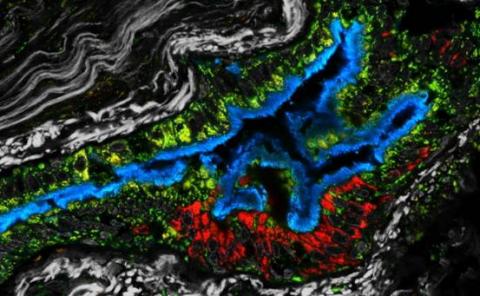Lungs for Living - Leading Lung Cancer Research
Lungs for Living - Leading Lung Cancer Research
UCL Hospitals Charitable Foundation is working with some of the world’s most respected and experienced researchers and clinicians to develop an integrated lung cancer research facility at UCLH. This would encompass clinical trialists, translational clinical studies and bio-banking, experimental medicine bench work and basic science. The researchers will have the common goal of biological discovery and improving patient care.
We are looking to raise funds for the creation of this lung cancer centre. This would enable UCLH to fund a laboratory refurbishment to create a translational research centre, core staff that will run the day to day research and manage the laboratories, new equipment, and a new professorial appointment to work alongside the research groups that will be based at the centre.
Lung cancer is the commonest cause of cancer death worldwide, causing more deaths than the next four commonest cancers combined (i.e. breast, colorectal, prostate and pancreas cancers; Jemal et al, 2009). Patients with early stage disease can undergo curative surgery, but unfortunately the majority of patients (85%) present with incurable advanced disease.
Lung cancer accounts for 22 per cent of all cancer deaths in Britain, but attracts only 3.9 per cent of research funding. The National Cancer Research Institute (NCRI) has recently called for greater translational research into lung cancer and stated that its priority area of biological research is to understand how normal lung cells first become dysplastic and subsequently progress to cancer. National funding opportunities in lung cancer biology are now approaching and we believe that UCL/UCLH, as an established centre for both lung epithelial biology and cancer research, should be at the forefront of such applications.
We therefore are looking for funding to enable UCLH’s existing and expanding group of outstanding early-stage lung cancer biologists to develop into a world class centre for lung cancer research. Moving these researchers into a specific lung cancer/ epithelial regeneration research facility (they are currently spread across campus) will enable collection of tissue and sharing of clinical samples, joint use of facilities and fertilization of ideas/ joint large programme grant applications.
Here at UCLH we have some the world’s leading experts in lung cancer including Dr Sam Janes, Adam Giangreco, Dr Neal Navani and Professor Charles Swanton. Lungs for Living is now seeking funds to pay for the lung cancer centre.
To find out more information about the Lungs for Living Appeal and lung cancer research at UCLH please visit www.lungsforliving.co.uk.
And in other news for Lungs for Living...
Lung cancer stem cell therapy to be trialled
Patients at UCL Hospitals will be the first in the world to receive a pioneering cell therapy that scientists hope will transform the treatment of lung cancer. The treatment uses stem cells taken from bone marrow that have been genetically modified to find and destroy cancer cells. Lung cancer patients currently face one of the worst survival rates amongst cancer patients, with only 5% of those diagnosed surviving beyond 10 years. Lung cancer kills around 34,000 people a year in the UK. If successful this treatment will offer new hope to cancer patients and their families.
The research will be led by Professor Sam Janes, a consultant at UCLH, who leads the Lungs for Living Research Centre, supported by UCL Hospitals Charitable Foundation.

A small clone of abnormal cells growing in a patient's airway (pictured right).
Early indications suggest that cell-based therapies could have a major impact on cure rates and survival times for patients. 'Cancers need something new. Chemotherapy works minimally and for a short while. This is truly experimental', Professor Sam Janes said. The trial will involve 56 patients who will begin treatment in early 2016. The group have all been diagnosed with metastatic lung cancer, at which point patients are usually only offered palliative care or treatments expected to extend life by a few months. The therapy works by modifying donor stem cells so that they express an anti-cancer gene called Trail that usually works in immune cells. The modified cells are strongly attracted to tumours and when they bind to them they trigger a 'suicide pathway' in cancer cells. The treatment has been shown to completely elmininate or significantly reduce tumours in mice, but until now it has not been tested in human patients.
'This will be the first cell therapy for lung cancer and the biggest manufacturing of cells of its kind' said Professor Sam Janes. Lungs for Living, a fundraising group set up under UCL Hospitals Charitable Foundation, raises funds for the lung cancer research led by Professor Janes. UCL Hospitals Charitable Foundation is working with some of the world's most respected and experienced researchers and clinicians to develop an integrated lung cancer research facility at UCLH for Professor Janes and his team.
Money donated will go towards funding a translational research centre that will encompass clinical trialists, translational clinical studies and bio-banking, experimental medicine bench work and basic science. The researchers will have the common goal of biological discovery and improving patient care.
If you would like to donate to the Lungs for Living Appeal please go to www.justgiving.com/UCLH-Charitable-FoundationLungsforLiving
If you would like more information on how to make a donation please click here or call Shirley Featherstone on 0203 447 9558.
Thank you for your support.
